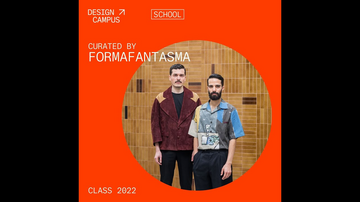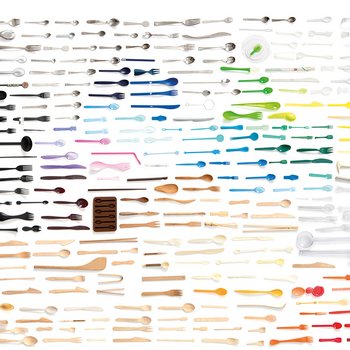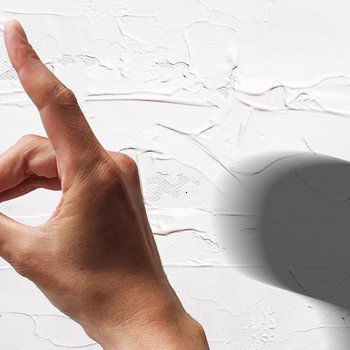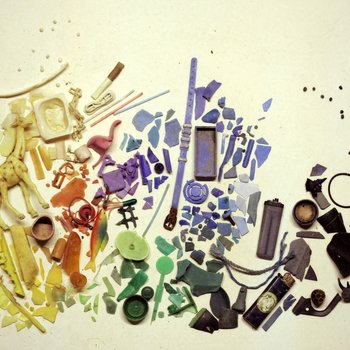
Ever since the Industrial Revolution, the production of goods has rapidly accelerated, resulting in a linear cycle of ‘extraction production-waste’. Still today, this sequential operation assumes an infinite supply of resources. The extraction and primary processing of metals alongside other minerals is responsible for around 26% of global carbon emissions.
Today, designers, architects and artists can be critical agents in the global system, but their skill set and perspective must expand rapidly beyond self-referential processes. As the finite resources of our planet become ever scarcer, we face an urgent need to revisit our knowledge of material supplies and production. Formafantasma invites participants to be part of ‘The School of the Untold’, a collaborative 6-weeks program based in the Design Campus at the Kunstgewerbemuseum in Dresden, Germany. The program will be radically rooted in an expansive understanding of realities that shape today’s world. We aim to dissect these complex entanglements through materiality. With this in mind, we will dig into the rich collection of the museum to explore the untold stories behind the historic legacy of the exhibited artefacts.
To question materiality is to question museology itself. Within the program, we want to revisit the material-based framework currently structuring the museum’s collection. Each week, a series of objects will be selected by the museum conservator from the collection’s themes: Metal, wood, ceramic, plastic, miscellaneous. The program aims to recontextualize the classification of objects made solely according to physical materiality. This categorisation stems from Gottfried Semper’s 1852 concept of ‘The Ideal Museum’. Based on his critical perspective of the Great Exhibition of 1851, Semper proposed a classification of museum collections constructed around materiality. His avantgarde concept, at that time, greatly influenced the ideological and spatial decisions behind many Applied Arts museum: one of them is the current Victoria and Albert Museum in London, another is the Kunstgewerbemuseum in Dresden, where the workshop will allow the participants to re-examine Semper’s proposition.
His history is intrinsically linked to that of the city of Dresden, where he started his career and has built several edifices while teaching at the local Art Academy. Together with the participants and the museum staff, we will rethink and deconstruct the way objects are showcased in museums. The program will look at Semper’s ‘integrated view of universality’ by approaching materiality through technique, craftsmanship and industries that shape our environment.
Weekly workshops, collection visits and lectures will be guided by designers and architects, but also by theoreticians, performance artists, curators, filmmakers and philosophers. The program explores material histories, cultural world-views, the relationship between tradition and local culture, critical approaches to ecology, colonialism, extractivism, the relation between human and non-human as well as the significance of objects as cultural conduits.
We hope to provide participants with opportunities to build up new methodologies combining hands-on material techniques with innovative media formats, historical philosophy with urgent critical discourse, and transparent collaboration with tactical subversion.
Formafantasma believes that it is through these diverse workshops (from filming through the museum to making material samples for instance) that we can forge new links between the artefacts displayed and larger geopolitical contexts that allowed the circulation of objects. It is only by fostering a community of architects, designers, artists but also talents with a background in human and scientific studies with curiosity and ambition towards design that we can develop investigative practices and instruments to facilitate change.
Every week, a final presentation will be held within the museum in dialogue with the collection. These new links will allow the participants to bring forward the immaterial culture that is not conserved in the museum and to question the reasons behind it. The program’s conclusions will later be part of the Kunstgewerbemuseum’s plan to recontextualise their permanent collection.
Also of interest:
Disposable plastic cutlery is an icon of the global throwaway culture. It has been banned in the EU since July 3, 2021. Based on the collection of designers Peter Eckart and Kai Linke, the exhibition "Spoon Archaeology" at the Kunstgewerbemuseum explores this topic.

The Spoon Archaeology exhibition is designed as a reaction to the EU ban on single-use tableware. But what will replace it? The designers Peter Eckart and Kai Linke, whose cutlery collections are on display in the Kunstgewerbemuseum this year, asked themselves that very question. It has to be sustainable and, of course, fit for purpose. The answer they have come up with has a far less futuristic ring to it than you might expect: the human hand. We join the Palais Café to try it out.

What remains of us? Currently quite a lot. In her film collage "Die Hüter des Unrats - eine kurze Geschichte des Abfalls" (The Guardians of Garbage - A Short History of Waste), which can currently be seen at the Japanisches Palais, Susann Maria Hempel takes a sarcastic look at the way we deal with waste and its ecological consequences. About the stomachs of predatory fish, chickens and giant tortoises as an archive.
